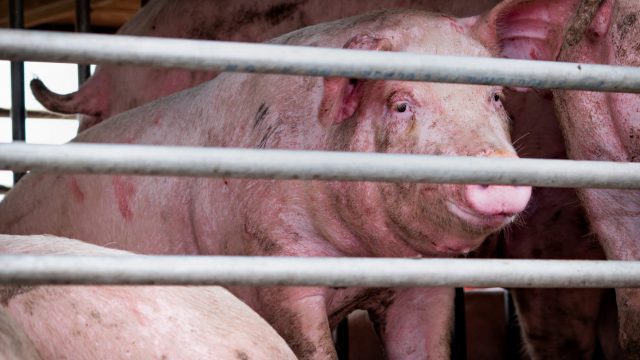Two Great Legal Victories for Animals in Oregon
August 7 was a busy day for animal lawyers in that the Oregon Supreme Court issued two important decisions: (1) State v. Nix, affirming the Oregon Court of Appeals decision by holding that animals who are abused by their owners are “victims” of those crimes, at least for sentencing purposes; and (2) State v. Fessenden/Dicke, ruling that the exigent circumstances exception to the warrant requirement can apply to animal cruelty victims in imminent harm. ALDF had filed amicus curiae (“friend of the court”) briefs in the Court of Appeals in Nix and in the Oregon Supreme Court in Fessenden/Dicke. In the latter, we were joined by the Association of Prosecuting Attorneys (APA) and the National District Attorneys Association (NDAA).
The Nix opinion tracks the logic of the Court of Appeals in large part and stands as a pillar for those who demand that our justice system recognizes animals as more than mere property by specifically holding that, for the purposes of Oregon’s anti-merger statute, ORS 161.067(2), animals abused by their owners are “victims.” The Court rooted its decision in legislative precedent and intent, finding that the Legislature’s goal in enacting the modern second-degree animal neglect statute, ORS 167.325, was “the treatment of individual animals, not harm to the public generally or harm to the owners of the animals.” Because the Oregon Legislature “regarded those animals [suffering from neglect] as the ‘victims’ of the offense,” the Court concluded that animals were likewise victims for purposes of merger. In reaching this conclusion, the Court cited the fact that ALDF funds a full-time, statewide prosecutor who is dedicated to handling only animal abuse cases in Oregon.
In State v. Fessenden/Dicke, the Court was exceptionally cautious in its approach, though it did ultimately reach the correct result. The Court found that an officer can seize an animal without a warrant when that officer has probable cause to believe the animal is a victim of cruelty and immediate action is necessary to prevent further imminent harm to the animal. In so ruling, the Court determined, for the first time in Oregon, that the exigent circumstances exception to the warrant requirement under both the Oregon Constitution (Article I, Section 9) and the Fourth Amendment can apply to cases involving animal victims. In reaching its conclusion, the Court noted—just as ALDF had in its amicus brief—that other states already allow such warrantless seizure to prevent serious injury caused by criminal activity, including California, Montana, and Texas. However, in a disappointing move, the Court declined to decide whether the emergency aid exception applies to animals—an exception similar to the exigent circumstances exception in that it allows warrantless entry to save life, but does not require probable cause—even though the Court of Appeals had extended the emergency aid exception to animal life.
Significantly, the Court soundly rejected defendants’ contention that animal protection laws exist solely for human benefit; while animals are property, said the Court, today Oregon has one of the most comprehensive schemes of animal protection that was clearly enacted to protect animal victims, regardless of ownership. In emphasizing the strength of Oregon’s laws, the Court cited ALDF’s Rankings Report and the Legislature’s finding that “animals are sentient beings capable of experiencing pain, stress and fear” as evidence of the ongoing evolution of the legal status of animals (legislation ALDF had help to draft and pass in 2013).
The facts of Fessenden/Dicke presented a clear case of imminent harm caused by criminal neglect: A veteran officer, experienced in animal cruelty cases, determined that the extremely emaciated horse required immediate seizure to survive and that there was not adequate time to obtain a warrant before the seizure. Based on the officer’s experience and his reasonable belief that the horse was a victim of cruelty, the Court ruled that his seizure of the dying horse was lawful under the exigent circumstances exception. The Court was careful to apply this exception to these specific facts, but explained that other circumstances may also trigger a similar application of the exception.
Our thanks and congratulations to Oregon Attorney General Ellen Rosenblum, Oregon Solicitor General Anna Joyce and Assistant Attorneys General Jamie Contreras and Pamela Walsh for their excellent work on these two important cases. Additionally, ALDF is so very grateful for the brilliant work of Virginia Coleman who was instrumental in preparing our amicus brief, and for the support of David LaBahn of the APA and Allie Philips of the NDAA in joining ALDF on this appeal.
Related
-
Animal Legal Defense Fund Grant Supported Washington Attorney General’s Enforcement of Animal Cruelty Law
The judge sentenced a Snohomish County resident for killing then displaying neighborhood wildlife and shooting a kitten in the eye.April 18, 2024 News -
REPORT: 95 Percent of Consumers Prefer “Climate-Friendly” Products, But Labels Oversell Emission Reductions
New report reveals how misleading labels lead to increased confusion among consumers searching for more sustainable, less environmentally damaging products.April 2, 2024 Press Release -
Lawsuit Filed Demanding FDA Respond to Petitions Seeking to Ban Ractopamine
FDA’s approval for ractopamine relied primarily on safety studies conducted by the drugmaker.March 26, 2024 Press Release



